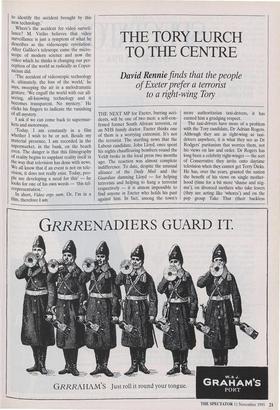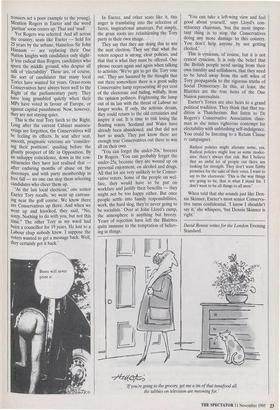THE TORY LURCH TO THE CENTRE
David Rennie finds that the people
of Exeter prefer a terrorist to a right-wing Toy
THE NEXT MP for Exeter, barring acci- dents, will be one of two men: a self-con- fessed former South African terrorist, or an NHS family doctor. Exeter thinks one of them is a worrying extremist. It's not the terrorist. The startling news that the Labour candidate, John Lloyd, once spent his nights chauffeuring bombers round the Veldt broke in the local press two months ago. The reaction was almost complete indifference. To date, despite the unusual alliance of the Daily Mail and the Guardian damning Lloyd — for helping terrorists and helping to hang a terrorist respectively — it is almost impossible to find anyone in Exeter who holds his past against him. In fact, among the town's more authoritarian taxi-drivers, it has earned him a grudging respect.
The taxi-drivers have more of a problem with the Tory candidate, Dr Adrian Rogers. Although they are as right-wing as taxi- drivers anywhere, it is what they see as Dr Rodgers' puritanism that worries them, not his views on law and order. Dr Rogers has long been a celebrity right-winger — the sort of Conservative they invite onto daytime television when they cannot get Terry Dicks. He has, over the years, granted the nation the benefit of his views on single mother- hood (time for a bit more 'shame and stig- ma'), on divorced mothers who take lovers (they are acting like 'whores') and on the pop group Take That (their backless trousers set a poor example to the young). Mention Rogers in Exeter and the word `puritan' soon comes up. That and 'mad'.
Yet Rogers was selected. And all across the country, seats like Exeter — held for 25 years by the urbane, blameless Sir John Hannam — are replacing their One Nation knights with candidates only slight- ly less radical than Rogers, candidates who spurn the middle ground, who despise all talk of 'electability'. These are, of course, the sort of candidates that many local Tories have wanted for years. Grass-roots Conservatives have always been well to the Right of the parliamentary party. They have long grumbled quietly when their MPs have voted in favour of Europe, or against capital punishment. Now, however, they are not staying quiet.
This is the real Tory lurch to the Right. Long after the current Cabinet manoeu- vrings are forgotten, the Conservatives will be feeling its effects. In seat after seat, smooth, pragmatic veterans are 'consider- ing their positions', quailing before the ghastly prospect of life in Opposition. By an unhappy coincidence, down in the con- stituencies they have just realised that after enduring months of abuse on the doorsteps, and with party membership in free fall — no one can stop them selecting candidates who cheer them up.
`At the last local elections,' one senior Exeter Tory recalls, 'we went up canvass- ing near the golf course. We know there are Conservatives up there. And when we went up and knocked, they said, "No, sorry. Nothing to do with you, but not this time." The other Tory in my ward had been a councillor for 19 years. He lost to a Labour chap nobody knew. I suppose the voters wanted to get a message back. Well, they certainly got it back.' In Exeter, and other seats like it, this anger is translating into the selection of fierce, inspirational amateurs. Put simply, the grass roots are refashioning the Tory party in their own image. They say that they are doing this to win the next election. They say that what the voters respect is strong, clear policies, and that that is what they must be offered. One phrase occurs again and again when talking to activists: 'We've got to get the Tory vote out.' They are haunted by the thought that out there somewhere there is a great sulky Conservative lump representing 40 per cent of the electorate and hiding, wilfully, from the opinion pollsters. Frightening the lump out of its lair with the threat of Labour no longer works. If only, the activists dream, they could return to the old certainties and inspire it out. It is time to risk losing the floating voters. Scotland and Wales have already been abandoned, and that did not hurt so much. They just know there are enough true Conservatives out there to win all on their own.
`You can forget the under-20s,' breezes Dr Rogers. 'You can probably forget the under-25s, because they are wound up on personal enjoyment, on alcohol and drugs. All that lot are very unlikely to be Conser- vative voters. Some of the people on wel- fare, they would have to be put on workfare and justify their benefits — they might not be too happy either. But once people settle into family responsibilities, work, the hard slog, they're never going to be socialists.' Over at John Lloyd's camp, the atmosphere is anything but breezy. Years of rejection have left the Blairites quite immune to the temptation of believ- ing in things. `You can take a left-wing view and feel good about yourself,' says Lloyd's con- stituency chairman, 'but the most impor- tant thing is to stop the Conservatives doing any more damage to this country. You don't help anyone by not getting elected.'
This is cynicism, of course, but it is not cynical cynicism. It is only the belief that the British people need saving from their own timidity and selfishness, that they need to be lured away from the soft wiles of Tory propaganda to the rigorous truths of Social Democracy. In this, at least, the Blairites are the true heirs of the One Nation paternalists.
Exeter's Tories are also heirs to a grand political tradition. They think that that tra- dition is Thatcherism. But listen to Dr Rogers's Conservative Association chair- man as she mixes righteous contempt for electability with unblushing self-indulgence. You could be listening to a Retain Clause iv campaigner.
Radical policies might alienate some, yes. Radical policies might lose us some moder- ates: there's always that risk. But I believe that an awful lot of people out there are looking for strength. They don't want flabby promises for the sake of their votes. I want to say to the electorate: 'This is the way things are going to be, that is what I stand for. I don't want to be all things to all men.'
When told that she sounds just like Den- nis Skinner, Exeter's most senior Conserva- tive turns confidential. 'I know I shouldn't say it,' she whispers, 'but Dennis Skinner is right.'
David Rennie writes for the London Evening Standard.
`If you're going to the grocery, get me a tin of that tunafood all the tabbies on television are meowing for.'



















































































 Previous page
Previous page